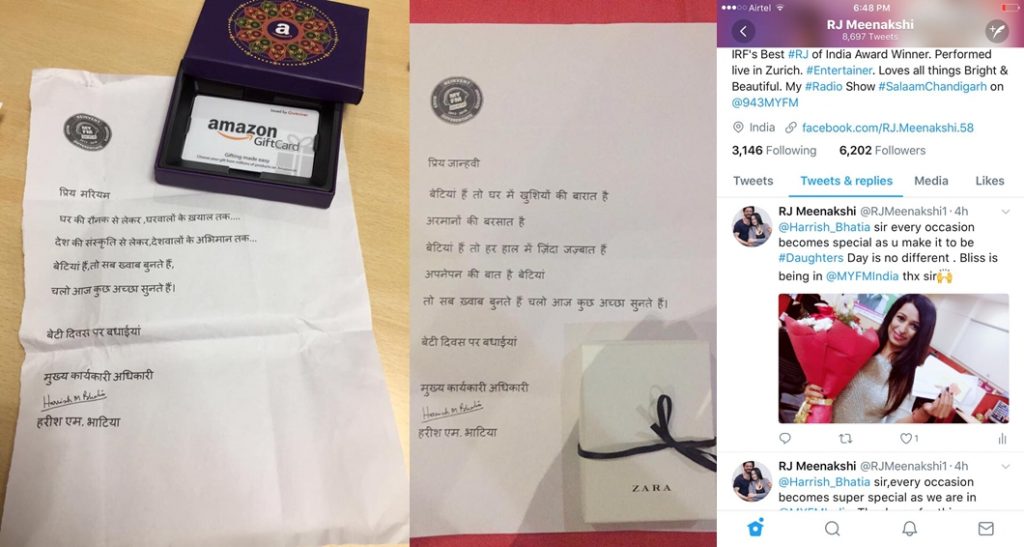MY FM has a host of initiatives designed to make people feel cared for just as their families value them.
In times when technology is influencing people’s decisions and practices, one important aspect that organisations need to keep in mind is that their employees are the same people at home, that is, they bring the same personalities to work. With that in mind, Dainik Bhaskar’s radio station network, MY FM, decided to treat its employees as real people with ambitions, expectations and struggles of their own rather than just a herd of workers for the company.
It not only celebrates its new joinees just as a family celebrates the arrival of a new baby, it also recognises their growth expectations and guides them through their journey to success. MY FM has a host of initiatives —both big and small — that have been designed with an objective to make people feel cared for, in the same way that their families value them.
Harrish Bhatia, CEO, 94.3 MY FM shares that in the year 2007–08, the company witnessed huge attrition and simultaneously he observed that most people leaving a job would cite issues with the manager or the boss as the reason behind leaving. While this could be partially true or even totally false, it meant that the employee carried and shared wrong perceptions about the workplace with their families. This led him to initiate a family-like culture at the workplace so that the employees feel comfortable in the workplace and carry the right kind of vibes back home.
In the year 2007–08, the company witnessed huge attrition due to issues with the manager or the boss This meant that the employee carried and shared wrong perceptions about the workplace with their families. This led him to initiate a family-like culture at the workplace so that the employees feel comfortable in the workplace and carry the right kind of vibes back home.
With that idea, MY FM started family-connect initiatives such as wishing employees’ parents on their special days, congratulating the family on an employee’s achievement, making staff take their mothers out for lunch on Mother’s Day, and so on. While MY FM connects with its employees’ families through these initiatives, it also has more in place to make the staff feel they are not just employees but an important part of the MY FM family at work.
Bhatia says, “Everyone joins an organisation hoping to excel in life. No one wants to taste failure, but at times certain things may not work out. When that happens, it is the family that comes to our support, and this is why we believe in celebrating people, their successes and handhold them in their struggles, helping them overcome their challenges and together achieve goals aligned with organisational objectives.”
The company organises a party for its new joinees and also has ‘first salary’ treats on completion of one month, just as an individual would celebrate with friends and family. “The smallest of gestures beyond monetary rewards, enhances people’s self-esteem and brings in a strong emotional connect, which is extremely important within an organisation, for people to be able to understand each other better,” Bhatia opines.
Recently MY FM celebrated Daughter’s Day, where all women employees were given personalised gifts with a special note from the CEO. The gesture was well appreciated by the women, and all of them felt deeply touched. Many of them even took to social media to share their feelings. The Company also recognised Karwachauth by giving gifts to all its married women employees, in the form of sargi. A small yet unique gesture, this further displays the intent of the organisation to build a strong emotional connect with its people.
On completion of each financial year, the top management team at MY FM goes out for a trip to some foreign country. The trip/experience is offered to those beyond just the top level—to the top performers as well. Under this initiative, Bhatia shares that about 15 per cent of the employees go abroad, based on their performance, every year.
In Bhatia’s own words, “The idea behind allowing the same perks and opportunities to people across levels comes from the fact that I believe that one should treat other people in the same way they expect others to treat them.” That said, Bhatia also takes out time to appreciate performers on social, professional and public platforms as he feels that such recognition really motivates people to do more. “Knowing that someone is noticing and appreciating the good work one does, is a huge motivation for most people,” he says.

That is not all. The company also doles out monthly rewards for performance. In addition, instead of yearly appraisals, MY FM has quarterly appraisals considering the dynamic environment and the fast growth expectations of the newer generation. “Quarterly appraisals allow us enough opportunity for course correction, if need be,” says Bhatia. The Company has a provision for salary revision twice in a year, but it has also rewarded extraordinary performance in between the cycles, whenever reported.
It is evident that in all these initiatives and in forming a conducive family-like culture, the CEO has an important role to play. Bhatia stresses this further by beautifully concluding, “HR will always do what it is supposed to be doing for the growth of the organisation, but if a CEO doesn’t show much interest in people agendas or employee-engagement initiatives, the activities will continue to take place but in a fragmented, tick-box manner and the intensity and impact will go down tremendously.”



